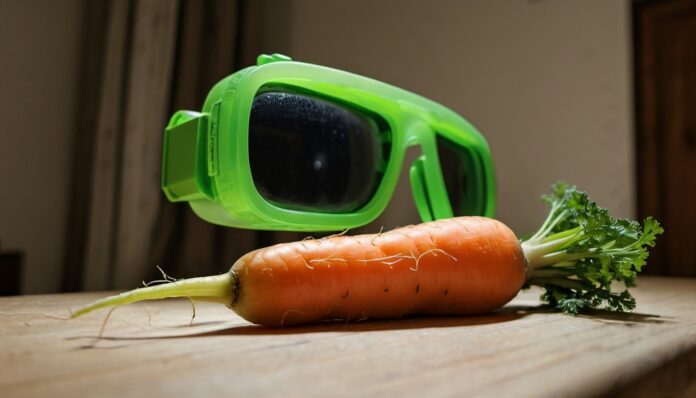The idea that eating carrots can improve your night vision is a widely recognized belief that has been passed down through generations. But is there any truth to this claim, or is it just a sweet tale? Let’s dive into the origins of this myth and explore the scientific facts behind it.
The Myth: Carrots Enhance Night Vision
The myth suggests that eating carrots, which are rich in vitamin A, can significantly enhance your ability to see in the dark. This belief has been so pervasive that many people still consider carrots a go-to food for better vision, particularly night vision.
The Truth: Carrots Support Overall Eye Health
While carrots do play a role in maintaining healthy vision, they do not possess the magical ability to drastically improve night vision. Vitamin A, which is abundant in carrots, is essential for good eye health and can help prevent certain vision problems, but it won’t turn you into a nocturnal superhero.
The Origin of the Myth: World War II Propaganda
The myth gained widespread popularity during World War II. The British Royal Air Force spread the story that their pilots had improved night vision due to eating carrots. This was actually a cover story to explain their success in shooting down enemy planes at night, which was due to the secret use of radar technology. The story served as both a morale booster and a way to mislead the enemy.
Nutritional Facts About Carrots
Carrots are high in beta-carotene, which the body converts into vitamin A (retinol). Vitamin A is crucial for maintaining healthy vision, particularly in low-light conditions, but it does not enhance night vision beyond normal levels.
How Vitamin A Works
Vitamin A is vital for the production of rhodopsin, a pigment in the retina that helps the eye detect light. Without enough vitamin A, the production of rhodopsin is impaired, leading to night blindness. Therefore, maintaining adequate levels of vitamin A is important for preventing vision problems.
While sufficient vitamin A is necessary for good vision, consuming it in excess does not further enhance night vision. Your body only uses as much vitamin A as it needs, and the rest is stored or excreted.
Benefits of Eating Carrots
Eating carrots contributes to overall eye health by providing essential nutrients like beta-carotene, which helps prevent deficiencies that could lead to vision problems.
Carrots offer a range of other health benefits, including:
- Improved Immune Function: Thanks to their antioxidant properties.
- Healthy Skin: Beta-carotene helps maintain healthy skin.
- Digestive Health: High fiber content aids digestion.
Practical Tips for Eye Health
To support and maintain good vision, including night vision, consider these tips:
- Eat a Balanced Diet: Include a variety of fruits and vegetables rich in vitamins A, C, and E, such as carrots, sweet potatoes, spinach, and bell peppers.
- Protect Your Eyes: Wear sunglasses to protect your eyes from UV rays and reduce the risk of cataracts.
- Regular Eye Exams: Visit an eye care professional regularly to monitor and maintain eye health.
- Limit Screen Time: Take breaks from screens to reduce eye strain and dryness.
- Stay Hydrated: Drink plenty of water to keep your eyes moist and healthy.
The myth that eating carrots can dramatically improve night vision is rooted in wartime propaganda rather than scientific fact. While carrots and other foods rich in vitamin A are essential for maintaining overall eye health and preventing deficiencies that can impair vision, they do not grant extraordinary night vision capabilities.
Understanding the real benefits of a balanced diet can help you maintain healthy vision and debunk popular myths. So, enjoy your carrots for their health benefits, but don’t expect them to give you night-vision superpowers.
